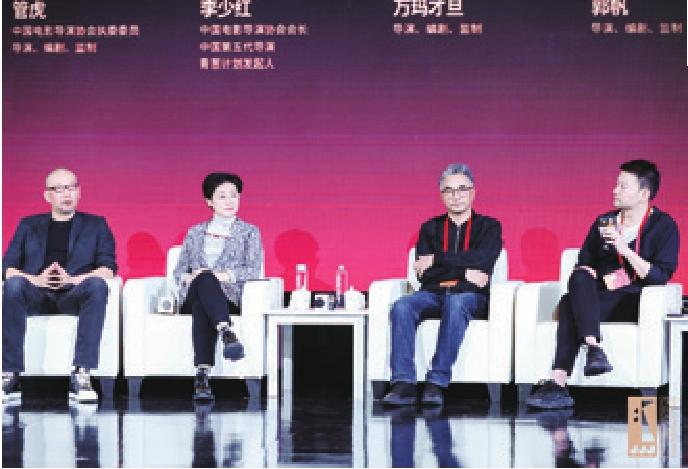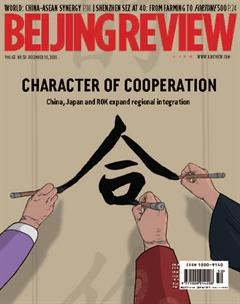Film Revival
By Yuan Yuan


It was the annual gathering of top filmmak- ers in China. The masks that the participants wore and nucleic acid tests that people had to go through before joining the event served as a reminder that the event was still held in the shadows of the novel coronavirus disease(COVID-19).
The Golden Rooster Awards, formerly staged once every two years, has become an annual event since this year. Different from being hosted across different cities around China in previous years, this event has chosen to settle down in Xiamen, a coastal city in Fujian Province in southeast China, for 10 continuous years starting this year. Established in 1981, the Year of the Rooster, this award has become one of the most prestigious national film awards in China.
The organizing committee, though shortening the 33rd China Golden Rooster Awards from five to four days on November 25-28 due to the ongoing pandemic, rolled out a full schedule by arranging more activities including concerts, screenings and forums at this festival.
The pandemic spell
Chinas film market encountered a nationwide stagnation in the first few months of 2020. A cluster of movies slated for release during the Spring Festival holiday, a peak time for the Chinese box office, announced an unspecified delay in coming to theaters.Li Shaohong, a 65-year-old film director, called it a disaster. “Ive never experienced anything worse than this in my film career,” she said at a forum at the festival on November 26. “It is a nightmare for the worlds film industry.”
Cinemas closed and all ongoing film shoots were forced to a halt. “For more than six months, we couldnt do a thing,” Li said. “What made it worse was that we didnt know how long we would have to wait.”
The revival came after more than 170 days of silence. On July 20, the cinemas were reopened, with three blockbusters immediately creating a frenzy. The Eight Hundred, released on August 21, became a box-office hit, scooping up over 3.11 billion yuan ($462 million), giving a strong shot to Chinas film market.
Leap, depicting the story of Chinas womens volleyball team, came in second and Legend of Deification, an animation on a legendary figure in ancient China, grossed over 1.6 billion yuan ($237 million) as the third on the list. By November 27, the box office in China reached 16.2 billion yuan ($2.4 billion), making it the largest one in the world.
Huang Xiaoming, winner of the best actor accolade at the Golden Rooster, attributed the revival of Chinas film industry to the effective measures that the Chinese Government has taken in controlling the spread of the epidemic. “Without the achievements China has made in containing COVID-19, we couldnt have seen the revival of Chinas film market this soon and we couldnt have made this festival happen this smoothly,” Huang said.
Li got involved in the creation of three movies in the latter half of this year. The three movies all relate to the unusual situation in 2020. “It was a surprise that I suddenly became very busy after a long rest,” Li said. “It has been a tough year for the film industry, but this year will be recorded from various perspectives by filmmakers in the future.”
The founder of WE Capital, Tang Xiaoming, said at the festival that the epidemic will reshuffle Chinas film market. “It has created more possibilities for the development of the film industry,” Tang said. “The crisis also means chances [for the industry].”
Quite a few movies intended to screen in traditional theaters switched to online platforms, creating a boom in the video streaming industry.
The movie Fantasy Magician, streamed on iQiyi, a major online video provider in China, has brought investors over 53 million yuan ($7.9 million), setting a new record. Considering the total investment in the movie was some 20 million yuan ($2.97 million), the investment reward stands over 200 percent.
“More filmmakers will create movies exclusively for online platforms,” Chen Hang, President of China Culture Industrial Investment Fund, said at a forum on November 25. Movies streaming online can be more flexible than the theater movies, Chen said. “For example, it can have more than one ending for the audience to choose from, whichever one they prefer to watch.”
Hi-tech was also a hot topic among the festivals filmmakers. They all believe that virtual reality (VR) and augmented reality (AR) will take on a more important role in the future as they can offer audiences a more immersive experi- ence. They also assume that science fiction films will carve out a larger market in the following years.
According to a report released at the China Science Fiction Convention 2020 held in Beijing earlier this year, the box office of homemade sci-fi movies in 2019 reached 7.14 billion yuan($1.06 billion) in China, more than twice the number of 2018.
The Wandering Earth, a 2019 science fiction epic, released a 2020 version with a few modifications. Guo Fan, director of the movie, announced at the forum of the festival that the sequel of the movie will be released in 2023.
Young power
A conference on innovation and investment in Chinas film industry was a highlight during this festival. It was the first time for the festival to host such a conference with top film investors and producers sitting together, discussing the future of Chinas filmmaking.At the Golden Rooster Awards Project Market, a side event of this conference, 16 young directors, selected from over 1,000 projects, elaborated the story that they want to turn into a movie at the roadshow to raise fund for their movies.
Many of the 16 directors have participated in other project markets at other film festivals and some of them have already obtained the initial funding for their movie projects.
“It is not easy for a new director to move forward with a film project,” said Pema Tseden, a film director from Tibet Autonomous Region in southwest China who already has nine movies under his belt. “Financing is the major issue. The younger directors nowadays are luckier than we were as there are more programs supporting them both financially and professionally.”
The Young Director Support Program under the China Film Directors Guild is a major program initiated in 2015 by the Chinese Government to support young talents. Each year, the program selects five young directors, supporting each one with 100 million yuan($14.93 million) in funding. More than 10 senior film directors and producers offer additional professional support to them as well. Celebrated film directors including Zhang Yimou and Jia Zhangke used to be the rotating chairs of this program.
Now, over 20 young directors from this program have successfully taken their debuts to various major film festivals. Guan Hu, the director of The Eight Hundred, was officially announced as the new chairman of this program on November 25.
“We have seen many new talented filmmakers at this years Golden Rooster Awards,”Guan said. “I hope such programs can give young directors more confidence to create more wonderful films.”

